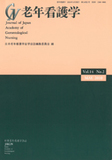Japanese
English
- 販売していません
- Abstract 文献概要
- 参考文献 Reference
本研究は,内科疾患の急性期治療目的で入院した高齢者の入院3日間のせん妄発症を予測し,予防ケアに結びつく看護アセスメントの視点を明らかにすることを目的に,高齢者の身体・認知機能,および,生活機能と環境変化に対する反応の観点から,入院時のせん妄リスク要因と入院3日間のせん妄発症有無との関連を検討した.
対象者は,内科疾患の急性期治療目的で入院した70歳以上の高齢者200人であり,入院3日間中にせん妄を発症した者は21人(発症率10.5%)であった.単変量解析で有意水準10%未満の22変数を説明変数とし,入院3日間のせん妄発症の有無を目的変数にロジスティック回帰分析(強制投入)を行った結果,(1)入院前の飲酒習慣あり,(2)寝つきが悪い,(3)ベンゾジアゼピン系薬の服用,(4)不安あり,(5)禁食指示あり,(6)入院を納得していない/不満の訴えあり,(7)入院時の随時血糖200 mg/dl以上,(8)見当識の低下,(9)便秘があるのに対応がとられていない,の9変数で有意な関連を認めた.
以上から,高齢者のせん妄発症の予測において,身体・認知機能だけでなく,入院治療に伴う食事,排泄,睡眠などの日常生活パターンの変化,および,それらの変化に対する高齢者の知覚や反応についてアセスメントし,看護介入を講じることが,せん妄発症の予防となる可能性が示唆された.
The purpose of this study was to investigate factors on admission indicating the risk of delirium early after admission in elderly patients who were admitted to hospital for acute-stage medical treatment and experienced rapid environmental changes.
The subjects were two hundreds of medical inpatients aged 70 years or older, admitted to general hospitals. Of the 200 patients, 21 developed delirium (incidence 10.5%) within 3 days after admission. Logistic regression identified nine variables related to incidence of delirium: alcohol consumption (OR=185.7, p=.019, 95%CI=2.4 to 14515.5), bad falling asleep (OR=159.5, p=.025, 95%CI=1.9 to 13476.6), benzodiazepine (OR=144.8, p=.012, 95%CI=3.0 to 6884.2), anxiety (OR=116.0, p=.020, 95%CI=2.1 to 6434.7), fasting (OR=95.8, p=.024, 95%CI=1.8 to 5090.1), dissatisfaction (OR=68.7, p=.039, 95%CI=1.2 to 3787.6), 200 mg/dl higher of blood sugar (OR=39.9, p=.048, 95%CI=1.0 to 1549.8), disorientation (OR=28.7, p=.019, 95%CI=1.7 to 472.2), and constipation (OR=15.6, p=.033, 95%CI=1.2 to 197.0).
The risk factors for delirium developed in this research incorporate the nursing perspective that patients as human beings are stimulated and reacting to their environment; this is different from the conventional medical model. The model shows promise for predicting delirium among elderly people admitted to hospitals for acute care and points the way to nursing care to prevent its onset.
Copyright © 2010, Japan Academy of Gerontological Nursing All rights reserved.


